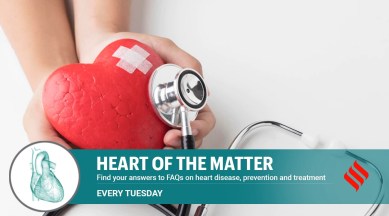Why this heart diet is all you need: 2-3 veggie servings, 200 g fruit, 15-20 g peanuts, says study
The PURE study, which factors in India, found that we suffer heart attacks because we do not have enough fruits, vegetables, wholegrains, legumes, nuts, dairy and fish. It has even set a heart-healthy food index, says Investigator, Dr Rajeev Gupta, Chair, Preventive Cardiology and Medicine, Eternal Heart Care Centre and Research Institute, Jaipur

For a long time, experts have focused on foods harmful to heart health. But now an international study, published in the July 2023 issue of the European Heart Journal, has found that heart diseases are triggered more by undernutrition of protective foods than a high intake of “harmful” foods. Conducted across 80 countries, the study has found that a low intake of specific types of protective foods — fruits, vegetables, whole grains, legumes, nuts, full-fat dairy products and fish — are associated with a higher number of heart attacks and strokes.
The Prospective Urban Rural Epidemiology (PURE) study recruited women and men between 30 and 69 years across 25 countries about 15 to 20 years ago. This observational study began in India in the early 2000s and has recruited more than 200,000 participants from low, lower-middle, upper middle and high-income countries in Asia, Europe, North and South America and Africa. It found that high carbohydrate intake and low intake of fruits, vegetables and unsaturated fats (monounsaturated and polyunsaturated fats) were responsible for an increased risk of heart disease. So, investigators developed a Healthy Dietary Index that led to protection from heart diseases and is suitable for populations of middle-aged women and men in lower-income countries such as those in South and Southeast Asia, Latin America, Central Europe, Asia and Africa. Most of the previously developed healthy dietary patterns such as the Mediterranean diet, DASH (Dietary Approaches to Stop Hypertension, US), and EAT-Lancet planetary diet were developed in Europe and North America. These dietary patterns are not based on the food easily available in lower-income countries, are expensive and not suitable for general populations in India and other lower-income countries. So, the PURE study investigators made the following recommendations for daily intake.
monthly limit of free stories.
with an Express account.
- Vegetables: About two to three servings daily or two medium-sized cups of leafy and other vegetables, partially boiled, steamed or sauteed and not heavily cooked.
- Raw fruits: About 200 g/day, equal to one banana, apple, guava or pear.
- Legumes: Half cup of lentils or beans (dal) daily.
- Nuts: Tree nuts or peanuts, 15-20g/day.
- Dairy products: Milk or yoghurt, 250-300 gm, 40-50 gm home-made cheese, butter/ghee.
- Whole grains: Indian flat bread, high-fibre bread, ½ cup cooked rice, barley, buckwheat and so on.
- Fish: 100 gm cooked fatty fish, thrice a week.
- Oils: Monounsaturated or polyunsaturated oils in small amounts (20-30g/day).
Although all the previous iterations of healthy diets recommend an almost similar diet, the PURE Healthy Diet is unique in recommending a high intake of dairy and dairy fats for the prevention of heart diseases. Nutritionists and physicians should discuss food preparation techniques with individuals and discourage shallow frying and repeated use of oils for cooking.
The PURE Healthy Dietary Index was classified into five categories, and it was found that as compared to the lowest index diet, the regular intake of the healthiest diet was associated with 20-40 per cent lower incidence of heart attacks and strokes. The PURE Healthy Diet was also evaluated and validated in cohorts from more than 60 middle and lower-income countries (data were available with the investigators), and it was confirmed that the high-index PURE diet is protective. Intake of the healthiest diet was associated with 30-50 per cent lower incidence of heart attacks and strokes in the validation cohort also.
Overall, the PURE Healthy Diet proposed by the study investigators, many from India, suggests that there is a need to move away from the restrictive dietary advice focusing on nutrients that we must avoid to a more proactive approach. Physicians, nutritionists and other health workers should promote the intake of heart-protective foods. A balanced approach towards food patterns (high intake of protective foods, balanced calorie intake, restriction of high intakes of unrefined carbohydrates and trans fats) is advised. Such diets are enjoyable and should be the mantra for the prevention and control of heart disease in India. There is an urgent need to implement policy interventions to increase the availability of healthy foods identified in the PURE study and rationalise their costs. The intake of unhealthy unrefined carbohydrates, trans fats, excessive salt and so on should be curtailed using several available public health strategies.
(The author is also Professor of Medicine, Mahatma Gandhi University of Medical Sciences & Technology, Jaipur, president, Indian Society of Hypertension and Convenor, Prevention Council, Cardiological Society of India)